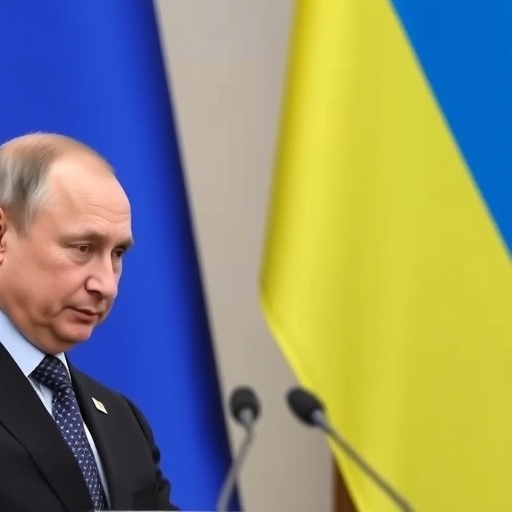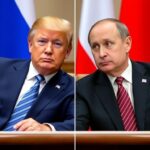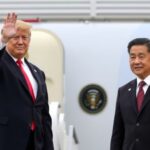Russia-Ukraine Peace Deal Nears Diplomatic Solution as Putin’s Envoy Signals Progress in Trilateral Talks
In a rare glimmer of hope amid the protracted Russia-Ukraine conflict, Kirill Dmitriev, special envoy to Russian President Vladimir Putin, has declared that a diplomatic solution is within reach. Speaking at an international forum in Moscow, Dmitriev revealed that ongoing negotiations involving Russia, the US, and Ukraine are advancing toward ending the three-year war, which has claimed tens of thousands of lives and devastated economies across Europe. This announcement comes as whispers of a potential Trump-Putin summit gain traction, offering a potential turning point in the crisis that began with Russia’s full-scale invasion in February 2022.
- Dmitriev’s Bold Claim: Trilateral Negotiations Gain Momentum
- Trump-Putin Summit Postponement Fuels Speculation on Future Talks
- Three Years of Conflict: From Invasion to Diplomatic Thaw
- Global Reactions and Hurdles in Russia-Ukraine Negotiations
- Envisioning Post-War Recovery: Steps Toward a Lasting Peace
Dmitriev’s comments, delivered with measured optimism, underscore a shift from the entrenched stalemate that has defined the conflict. “We are closer than ever to a diplomatic solution that respects the security interests of all parties,” he stated, emphasizing the role of multilateral dialogue. The envoy’s remarks have sparked cautious excitement among diplomats and analysts, who note that any breakthrough could reshape global alliances and energy markets.
Dmitriev’s Bold Claim: Trilateral Negotiations Gain Momentum
Kirill Dmitriev, a seasoned financier turned diplomatic troubleshooter, has emerged as a key voice in Russia‘s outreach efforts. Appointed as Putin’s special representative for U.S.-Russia ties in 2022, Dmitriev has navigated the treacherous waters of sanctions and isolation to foster backchannel communications. In his latest address, he highlighted the progress in trilateral negotiations between Russia, Ukraine, and the US, describing them as “constructive and detailed.”
According to Dmitriev, recent rounds of talks—held virtually and in neutral locations like Istanbul and Geneva—have focused on core issues such as territorial integrity, demilitarization zones, and economic reconstruction. “The involvement of the US has been pivotal,” he added, crediting American mediators for bridging gaps that previously seemed insurmountable. While specifics remain confidential, sources close to the discussions indicate that proposals for a ceasefire along current frontlines are under serious consideration, potentially halting the daily artillery exchanges that have become a grim routine.
The envoy’s optimism is tempered by realism. He acknowledged the war’s toll: over 500,000 military casualties on both sides, according to UN estimates, and the displacement of more than 10 million Ukrainians. “A diplomatic solution isn’t just about stopping the guns; it’s about rebuilding trust,” Dmitriev emphasized. His words echo a broader Russian narrative that portrays the conflict as a defensive response to NATO expansion, a claim vehemently disputed by Kyiv and Washington.
Experts like Dr. Elena Petrova from the Moscow Institute of International Relations praise Dmitriev’s approach. “He’s leveraging his business acumen to treat diplomacy like a high-stakes merger,” she told reporters. Yet, skeptics in Ukraine warn that such overtures may be tactical, aimed at easing sanctions rather than genuine peace.
Trump-Putin Summit Postponement Fuels Speculation on Future Talks
The shadow of a potential Trump-Putin meeting looms large over these developments. Initially slated for early December in Doha, Qatar, the summit was postponed due to scheduling conflicts, according to Dmitriev. Far from a cancellation, he insisted it remains “on the horizon,” likely to occur in the coming months as the new U.S. administration under President-elect Donald Trump settles in.
Trump, who has repeatedly vowed to end the Russia–Ukraine war “in 24 hours,” has positioned himself as a dealmaker capable of resolving the impasse. During his campaign, he criticized the Biden administration’s aid to Ukraine as endless and ineffective, promising instead a negotiated settlement that could involve concessions on NATO membership for Kyiv. Dmitriev’s update aligns with this rhetoric, suggesting that preliminary feelers between Trump‘s transition team and Russian officials have been positive.
“The postponement allows for more preparation, ensuring a productive dialogue,” Dmitriev said, hinting at agenda items like arms control and energy cooperation. Historical precedents, such as the 2018 Helsinki summit between Trump and Putin, provide context; that meeting yielded no concrete outcomes but established personal rapport. Analysts speculate that a revived summit could accelerate negotiations, potentially leading to a framework agreement by mid-2025.
However, challenges abound. Ukraine‘s President Volodymyr Zelenskyy has expressed wariness, stating in a recent interview, “Any deal must prioritize our sovereignty—no shortcuts.” European allies, including Germany and France, fear that a U.S.-led process might sideline their interests, prompting calls for inclusive talks under the Normandy Format.
To illustrate the stakes, consider the economic ripple effects: the war has driven global food prices up by 20% and European gas costs to record highs. A successful Trump-Putin engagement could stabilize these markets, but failure risks escalation, including deeper Russian incursions into Donbas.
Three Years of Conflict: From Invasion to Diplomatic Thaw
The Russia–Ukraine war, now entering its fourth year, traces its roots to the 2014 annexation of Crimea and the ensuing separatist unrest in eastern Ukraine. Russia’s full-scale invasion on February 24, 2022, marked a seismic shift, drawing widespread condemnation and triggering unprecedented sanctions. What began as a blitzkrieg aimed at Kyiv has devolved into a grinding war of attrition, with frontlines barely moving since late 2022.
Key milestones include Ukraine‘s resilient defense in Kyiv, the liberation of Kharkiv in 2022, and Russia’s withdrawal from Kherson later that year. On the flip side, Moscow’s capture of Bakhmut in 2023 symbolized the conflict’s brutality, with urban warfare claiming thousands. Casualty figures are staggering: Ukraine reports over 100,000 soldiers killed, while independent estimates put Russian losses at 300,000 wounded or dead.
Economically, Ukraine has lost 35% of its GDP, per World Bank data, with infrastructure damage exceeding $150 billion. Russia, despite sanctions, has rerouted trade to Asia, maintaining a war economy fueled by oil revenues topping $300 billion annually. International aid to Ukraine has surpassed $200 billion, mostly from the US and EU, underscoring the war’s global cost.
Recent battlefield dynamics have nudged parties toward talks. Ukraine‘s incursion into Russia’s Kursk region in August 2024 demonstrated Kyiv’s resolve but strained resources. Meanwhile, Russia‘s advances in Pokrovsk highlight the need for de-escalation. Dmitriev’s announcement arrives against this backdrop, suggesting that war fatigue is compelling compromise.
Human stories amplify the urgency. In Lviv, displaced families share tales of loss, while in Moscow, anti-war protests—though suppressed—reveal domestic pressures on Putin. These narratives humanize the statistics, pressing leaders to pursue a diplomatic solution.
Global Reactions and Hurdles in Russia-Ukraine Negotiations
Dmitriev’s statement has elicited a spectrum of responses worldwide. In Washington, Trump‘s incoming team has signaled openness, with advisor Keith Kellogg noting, “Diplomacy is our priority—let’s end this senseless war.” Yet, bipartisan concerns persist; Senate Foreign Relations Committee Chair Ben Cardin urged caution, warning against rewarding aggression.
In Ukraine, reactions are mixed. Zelenskyy welcomed the overture but stressed, “Peace must be just, not imposed.” Public opinion polls show 60% of Ukrainians favor negotiations, up from 40% in 2023, reflecting exhaustion. European leaders, meeting in Brussels, emphasized unity: EU foreign policy chief Josep Borrell called for “guaranteed security for Ukraine” in any deal.
China and India, as neutral players, have voiced support. Beijing, a key Russian ally, hosted preliminary talks in 2023, while New Delhi’s mediation offers add diversity. Hurdles remain formidable: Russia demands recognition of annexed territories, Ukraine seeks full withdrawal, and the US prioritizes containing Russian influence.
Sanctions complicate matters; the EU’s 14th package targets 200 entities, yet enforcement gaps allow evasion. Humanitarian corridors and prisoner swaps—over 1,000 exchanged last year—offer small wins, building momentum for broader negotiations.
Security guarantees are pivotal. Proposals include a UN-monitored buffer zone and multilateral pacts akin to the Minsk agreements, though past failures breed skepticism. Environmental fallout, like the Kakhovka Dam breach flooding 600 square kilometers, adds urgency to resolution.
Envisioning Post-War Recovery: Steps Toward a Lasting Peace
Looking ahead, a diplomatic solution could unlock transformative opportunities. Reconstruction in Ukraine might cost $500 billion, per Kyiv’s estimates, with international funds like the EU’s Ukraine Facility providing $50 billion. Russia could reintegrate into global finance, easing its isolation since 2022.
Geopolitically, success might deter adventurism elsewhere, from Taiwan to the Middle East. Energy security would improve, with Black Sea grain exports resuming to avert famines in Africa. For Trump, brokering peace would cement his legacy as a peacemaker.
Next steps include resuming trilateral meetings in January 2025, potentially in Vienna. Confidence-building measures, such as halting drone strikes, are essential. Civil society roles—through forums like the Ukraine Peace Platform—can amplify voices for reconciliation.
Ultimately, ending the war demands bold leadership. As Dmitriev put it, “The time for diplomacy is now.” With stakes this high, the world watches intently for signs of progress in these Russia–Ukraine negotiations.








